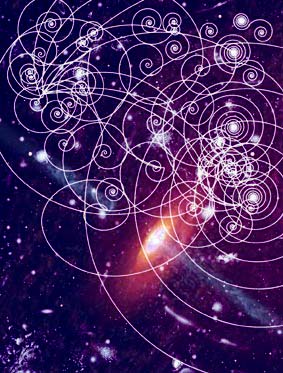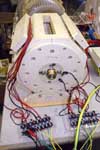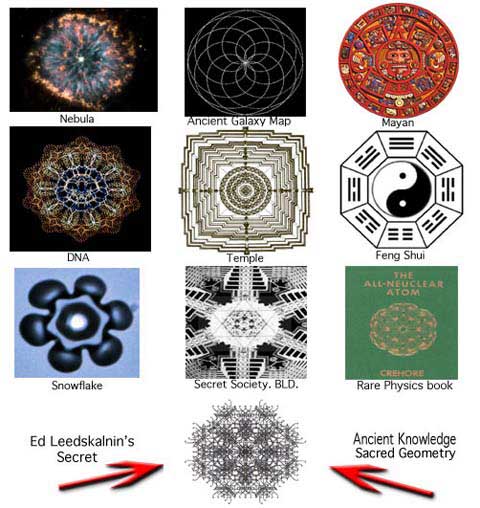Magnetic energy? Perhaps
2005 09 08
By David Lazarus | SFGgate.com
 The nation's energy industry is struggling to recover from Hurricane Katrina. Gas prices are soaring as a result of the catastrophic storm. America's reliance on overseas oil increases every year. The nation's energy industry is struggling to recover from Hurricane Katrina. Gas prices are soaring as a result of the catastrophic storm. America's reliance on overseas oil increases every year.
And from his office in the North Bay city of Sebastopol, Mark Goldes envisions a day -- perhaps not so far off -- when none of this will be a problem.
Goldes, 73, is chief executive of a small company called Magnetic Power Inc., which has spent years researching ways to, yes, generate power using magnets.
Within a few months, he says, he might just have a breakthrough to report that could revolutionize where people get fuel.
"We're not yet ready to talk about what's happening in our lab because, honestly, we don't know what's happening," Goldes told me. "All we know is that we're seeing more energy output than input.
"We're still having trouble making it repeatable, but we think that's more an engineering problem than a scientific problem," he said.
Does Goldes realize what's he's saying -- that he's perhaps discovered a clean, inexhaustible energy source?
"That's exactly what it appears to be," he answered.
What Goldes believes he's done is produce power from what physicists call zero-point energy. In simple terms, zero-point energy results from the infinitesimal motion of molecules even when seemingly at rest.
OK, let's throw a whole bunch of caveats at this. First of all, I've spoken with physicists at some of the country's most prestigious institutions, and not one said that what Goldes claims to have accomplished is doable.
Theoretically possible, they acknowledged. But not doable.
"Zero-point energy is so tiny that nobody can feel it," said Hossein Sadeghpour, a physicist at the Harvard-Smithsonian Center for Astrophysics. "But when you get to the realm of quantum mechanics, it exists.
"The question is, how do you harness it? I have not seen any meaningful theory or demonstration of that. It's not impossible, but I don't know how you would do it."
Moreover, it's all well and good to make stupendous scientific claims. But until those claims are verified by other scientists, that's all they are.
Remember cold fusion?
"You're right to be skeptical," Goldes responded. "The only way anyone is going to believe this is if they can see it with their own eyes, and we don't yet have working models that are repeatable."
But he said he expects to have something that another lab can inspect and replicate by the end of the year.
On top of that, Goldes said he'll have a prototype next year for a small generator using his magnetic technology that can produce enough power to run kitchen appliances.
Normally, I dismiss such pie-in-the-sky pronouncements (and I receive more than my share). During the California energy crisis, I was contacted repeatedly by some guy who said he'd invented a car engine that runs on ordinary water.
I'm still waiting for it to hit the market.
But Goldes isn't so easy to shrug off. That's because he's also come up with technology called the UltraConductor, which purports to be capable of conducting electricity at room temperature with no resistance, thus vastly improving fuel efficiency.
The research was funded in part by the Department of Defense, which invested $600,000 in the project. The technology also has been replicated elsewhere.
Matt Aldissi, who runs a Florida research firm called Fractal Systems, reproduced Goldes' UltraConductor as part of work on conductivity he was performing for the U.S. Air Force.
He told me that he visited Goldes' Sebastopol lab a few years ago and was impressed by what he saw.
"Is this guy legit? Yes," Aldissi said. "The work he claims to have done, he's done it."
That is, the work on conductivity. Energy from magnets? "I don't know anything about that," Aldissi said.
The magnets are part of creating what's known in physics as the "Casimir effect," in which seemingly motionless molecules are in fact moving around and expending energy.
"For many years the Casimir effect was little more than a theoretical curiosity," says PhysicsWeb, the online arm of Physics World magazine. "But interest in the phenomenon has blossomed in recent years."
Ori Ganor, an associate professor of physics at UC Berkeley, said the Casimir effect makes it theoretically possible to capture power from zero-point energy.
"Physics doesn't rule this out," he said. "But I don't see how it is commercially viable."
Stanley Wojcicki, a Stanford physics professor, said it may be possible to generate small amounts of power from zero-point energy, but not in any sustainable way.
Yet he noted that astonishing breakthroughs can come from unlikely sources.
"Einstein worked in a patent office," Wojcicki observed. "All sorts of people can have brilliant ideas."
Goldes said he's reluctant to provide details of his zero-point-energy technology until he's got a better handle on how it does what he says it does.
"We're seeing energy produced in a way that has to have a source," he said. "The only explanation we see is zero-point energy. There could be another, but we don't see what it could be."
A handful of other companies worldwide are believed also to be pursuing zero-point energy via magnetic systems. One of them, InterStellar Technologies, is run by a former scientist at NASA's Jet Propulsion Laboratory in Pasadena.
According to Aviation Week & Space Technology magazine, the Pentagon and at least two large aerospace companies are actively researching zero-point energy as a means of propulsion.
"If their efforts pay off," the magazine reported last year, "ZPE-driven power plants might enable Mach 4 fighters, quiet 1,200-seat hypersonic airliners that fly at 100-mile altitudes as far as 12,000 miles in about 70 minutes and 12.6-hour trips to the moon."
Is it a pipe dream? Goldes doesn't think so.
"You can't build a perpetual-motion machine," he said. "But this is real."
My inclination is to suspect that cheap, limitless energy is probably a crock. Goldes might sincerely buy into this stuff, but there's undoubtedly another explanation for what he claims to have achieved in his lab.
Then again, what if he's right?
David Lazarus' column appears Wednesdays, Fridays and Sundays. He also can be seen regularly on KTVU's "Mornings on 2." Send tips or feedback to dlazarus@sfchronicle.com.
Article from: http://www.sfgate.com/cgi-bin/article.cgi?f=/c/a/2005/09/07/BUG9NEJD3L1.DTL
The Techno Maestro's Amazing Machine
 Kohei Minato and the Japan Magnetic Fan Company: a maverick inventor's breakthrough electric motor uses permanent magnets to make power -- and has investors salivating Kohei Minato and the Japan Magnetic Fan Company: a maverick inventor's breakthrough electric motor uses permanent magnets to make power -- and has investors salivating
When WE first got the call from an excited colleague that he'd just seen the most amazing invention -- a magnetic motor that consumed almost no electricity -- we were so skeptical that we declined an invitation to go see it. If the technology was so good, we thought, how come they didn't have any customers yet?
We forgot about the invitation and the company until several months later, when our friend called again.
"OK," he said. "They've just sold 40,000 units to a major convenience store chain. Now will you see it?"
Read more: The Techno Maestro's Amazing Machine
Coral Castle Code
the hidden blueprint of natures magnetic currents of structure and creation

More: Jon De'Pew - Coral Castle Code
Download: Jon De'Pew on Jeff Rense & RadiOrbit - Coral Castle Code Broken!?
Related: Free Energy - Vortex Mechanics vs Quantum Mechanics
Chariots of the Grids - Free Energy

|
